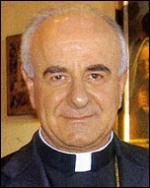
Vincenzo Paglia
Catholic Archbishop, President of the Pontifical Academy for Life, Holy Seebiography
In the passage of the First Letter of John we just listened to, the author reminds the disciples that the first words they heard were about love, namely "love one another". Actually, they are not only the opening words of a preaching: they are the very foundation of faith. Only from their brotherly love for one another the disciples will be recognised as such, and only by loving each other men and women will find salvation. To this respect, the example of Cain is particularly eloquent. It may seem an exaggeration. Yet, whoever allows the bitter herbs of pride and ego grow in his or her heart will fall into the spiral of enmity which leads to murderous violence. This is what happened to Cain, “who was evil”, as the letter underlines. Jesus warns his disciples against this danger: “You have heard that it was said to those of ancient times, 'You shall not murder'; and 'whoever murders shall be liable to judgement'. But I say to you that if you are angry with a brother or sister, you will be liable to judgement; and if you insult a brother or sister, you will be liable to the council; and if you say 'You fool', you will be liable to the hell of fire" (Mt 5:21-22). The love of Jesus, a borderless love, is the core principle of the disciple's entire life.
Whoever does not welcome the love of Jesus ends up falling into the trap of the prince of this world. There is no middle course between love and hatred: either you choose the former, or you become slave of the latter. Only love makes us free, and saves us. It is the truth that we are demanded to live, and the Gospel that we are required to witness to this world of ours, struggling to find peace, justice and harmony. It is a Gospel which is irreconcilable with the culture of materialism which subdues the hearts and minds of people. That is why the apostle warns Christians: "do not be astonished that the world hates you". Jesus himself was the first who experienced the world's opposition. In our days, the sequence of witnesses, of those who live their faith to the point of shedding their own blood, continues its progression. We had the privilege to know a few of them personally. They tell us, according to the apostle’s word: "We know love by this, that he laid down his life for us - and we ought to lay down our lives for one another". Indeed, these new martyrs stand in front of us as those who loved “not in word or speech, but in truth and action”. Bishop Romero, archbishop of San Salvador, in his homily at the funeral of one of his priests, killed by the death squads, once said: "the Second Vatican Council requires all Christians to be martyrs, to lay down their lives for their brothers and sisters; for some of them this goes up to shedding their own blood, from all, it requires a witness of love”. A few months later he was killed. The life of martyrdom, to lay down one’s own life for the sake of the Gospel, is set before us, while this new millennium moves its first steps.
We are listening to these words in Sarajevo, a city that in the last century has endured the tragedy of war and death. While these days come to an end, we are gathered together in prayer, we want to thank the Lord for having donated us dreams of peace. In some way, we have been encompassed in the same vision of God, which is much broader than our own. He was moved by the sadness of the human condition, to the point of sending us his Son. He donates us his look of love. Accordingly, we turn to this land and to all the lands of earth, especially those marked by violence, with the same eyes of God. His love must dwell in our heart. No matter if our heart reproaches us. What is required from us is to free, and not to hinder, love which has been poured into our hearts. This is why the apostle alerts us: "How does God’s love abide in anyone who has the world’s goods and sees a brother or sister in need and yet refuses help?” Let us free in our inner self the vision of peace we received. Let us allow the love of God to operate amongst us. We will walk on the path of love. Along this path we will meet the poor: may they always be our dearest friends, the companions of our journey. The poor guarantee us that we are on the right path, the path of God, and that we are taking part to his dream for the world: transform all peoples of the earth into the great family of the children of God.